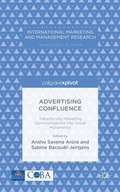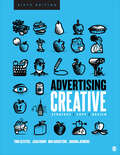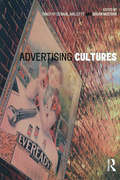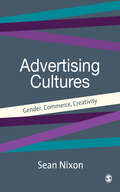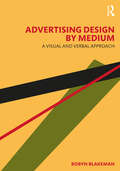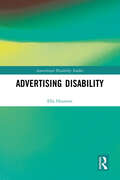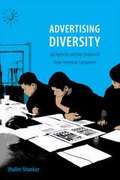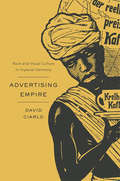- Table View
- List View
Advertising Basics
by J. V Vilanilam A. K. VargheseThis book introduces the readers-students of mass communication departments and those who have already entered the world of advertising-to the history, socioeconomic importance and the practical aspects of creating ad copy for the print and electronic media.
Advertising Basics!: A Resource Guide for Beginners (Response Books)
by J V Vilanilam A K VargheseAdvertising Basics! is a one-stop resource for anyone who wishes to understand and unravel the exciting world of advertising. Beginning from the basics, the book uses a simple commonsense approach to explain everything one wants to know about advertising and how the industry works on a daily basis. The book begins with a brief history which gives the reader an understanding of how advertising has evolved from the way it was practiced earlier in the teeming bazaars to its sophisticated and technologically advanced avatar today. The authors then discuss each aspect of the advertising industry in detail, giving pointers, suggestions and in-depth analysis of how things work in each department. Some of the highlights of this text are: - A holistic introduction which gives the reader a pan-industry perspective of advertising. - The nitty-gritties of copywriting for the main media-newspapers, magazines, radio, film, television and the Internet. - Detailed chapters on advertising agencies, client servicing and the creative aspects of advertising. - Pointers on how to conduct an advertising campaign. - Numerous advertisements which illustrate the theory and examples used in the book. - Tips on how to select an advertising agency and in what circumstances the agency should be changed. - A simple, approachable and anecdotal style of writing which the reader will enjoy.
Advertising Campaign Design: Just the Essentials
by Robyn BlakemanThe author's step-by-step approach to campaign design dissects the creative process necessary to design a successful integrated marketing communications campaign one topic at a time, creating an invaluable research tool that students and professors alike will refer to time and time again.
Advertising Campaign Planning: Developing An Advertising-based Marketing Plan
by Jim AveryThis book is designed for student ad agencies and college campaign "teams" for the AAF/NSAC College World Series of Advertising. The basis of the book is a powerful interlocking marketing plan, based on the P&G/WRG (Wells Rich Greene) system. Best practices are presented in a clear and easy to follow sequence.
Advertising Campaigns Workbook
by Kim Bartel Sheehan David Koranda Harshavardhan GangadharbatlaAdvertising Campaigns Workbook
Advertising Concept and Copy (3rd Edition)
by George FeltonThis book shows how to find strong selling ideas and how to express them in fresh, memorable, persuasive ways.
Advertising Confluence: Transitioning Marketing Communications into Social Movements
by Anshu Saxena Arora Sabine Bacouël-JentjensAdvertising Confluence offers a unique blend of both traditional and contemporary social media thinking about advertising and integrated brand promotions from both the developed and emerging world.
Advertising Creative: Strategy, Copy, Design
by Tom Altstiel Jean GrowWritten in an accessible style, Advertising Creative has become a key resource on the most recent trends of strategy, concepts, design, and integration of media and technology. The Third Edition gets right to the point of advertising by stressing key principles, illustrating them, and then providing practical information students and working professionals can use. Drawing on their own personal experience as award-winning experts in the creative advertising field, Tom Altstiel and Jean Grow offer a unique blend of real world and academic perspectives as they examine relevant and cutting-edge topics, including global, social media, business-to-business, in-house, and small agency advertising. Indeed, this hands-on textbook takes you well beyond traditional media topics, offering engaging examples and case histories on hot issues such as digital technology and tools, diversity, and an ever-expanding global marketplace.
Advertising Creative: Strategy, Copy, and Design
by Tom Altstiel Jean M. Grow Joanna L. Jenkins Dan AugustineAdvertising Creative, Sixth Edition gets right to the point of advertising by stressing key principles and practical information students and working professionals can use. Drawing on personal experience as award-winning experts in creative advertising, this new edition offers real-world insights on cutting-edge topics, including global, social media, business-to-business, in-house, and small agency advertising. In the new edition, authors Tom Altstiel, Jean Grow, Dan Augustine, and Joanna Jenkins take a deeper dive into the exploration of digital technology and its implications for the industry, as they expose the pervasive changes experienced across the global advertising landscape. Their most important revelation of all is the identification of the three qualities that will define the future leaders of this industry: Be a risk taker. Understand technology. Live for ideas. The latest edition addresses some of the key issues impacting our industry today, such as diversity in the workplace, international advertising, and design in the digital age.
Advertising Creative: Strategy, Copy, and Design
by Tom Altstiel Jean M. Grow Joanna L. Jenkins Dan AugustineAdvertising Creative, Sixth Edition gets right to the point of advertising by stressing key principles and practical information students and working professionals can use. Drawing on personal experience as award-winning experts in creative advertising, this new edition offers real-world insights on cutting-edge topics, including global, social media, business-to-business, in-house, and small agency advertising. In the new edition, authors Tom Altstiel, Jean Grow, Dan Augustine, and Joanna Jenkins take a deeper dive into the exploration of digital technology and its implications for the industry, as they expose the pervasive changes experienced across the global advertising landscape. Their most important revelation of all is the identification of the three qualities that will define the future leaders of this industry: Be a risk taker. Understand technology. Live for ideas. The latest edition addresses some of the key issues impacting our industry today, such as diversity in the workplace, international advertising, and design in the digital age.
Advertising Creative: Strategy, Copy, and Design
by Tom Altstiel Jean M. GrowAdvertising Creative is the first “postdigital” creative strategy and copywriting textbook in which digital technology is woven throughout every chapter. The book gets right to the point of advertising by stressing key principles and practical information students and working professionals can use to communicate effectively in this postdigital age. Drawing on personal experience as award-winning experts in creative advertising, Tom Altstiel and Jean Grow offer real-world insights on cutting-edge topics, including global, social media, business-to-business, in-house, and small agency advertising. In this Fourth Edition, Altstiel and Grow take a deeper dive into the exploration of digital technology and its implications for the industry, as they expose the pervasive changes experienced across the global advertising landscape. Their most important revelation of all is the identification of the three qualities that will define the future leaders of this industry: Be a risk taker. Understand technology. Live for ideas.
Advertising Creative: Strategy, Copy, and Design
by Tom Altstiel Jean M. GrowAdvertising Creative is the first “postdigital” creative strategy and copywriting textbook in which digital technology is woven throughout every chapter. The book gets right to the point of advertising by stressing key principles and practical information students and working professionals can use to communicate effectively in this postdigital age. Drawing on personal experience as award-winning experts in creative advertising, Tom Altstiel and Jean Grow offer real-world insights on cutting-edge topics, including global, social media, business-to-business, in-house, and small agency advertising. In this Fourth Edition, Altstiel and Grow take a deeper dive into the exploration of digital technology and its implications for the industry, as they expose the pervasive changes experienced across the global advertising landscape. Their most important revelation of all is the identification of the three qualities that will define the future leaders of this industry: Be a risk taker. Understand technology. Live for ideas.
Advertising Creative: Strategy, Copy, and Design
by Tom Altstiel Jean M. Grow Marcel JenningsAdvertising Creative, Fifth Edition continues to weave discussions about digital messaging through every chapter. Yet, the underlying theme is still about one thing that never changes—the need for fresh concepts and big ideas in pursuit of the One Thing. This edition introduces a new co-author, Marcel Jennings, who brings a fresh perspective from his background as a copywriter and creative director, as well as teaching at Virginia Commonwealth University. As always, the authors draw upon their experiences as working advertising professionals and teachers to get right to the point, stressing key principles and practical information that students and working professionals can use to communicate more effectively to build memorable brands. They also address some of the key issues impacting our industry today, such as gender equality, diversity in the workplace, and business ethics.
Advertising Creative: Strategy, Copy, and Design
by Tom Altstiel Jean M. Grow Marcel JenningsAdvertising Creative, Fifth Edition continues to weave discussions about digital messaging through every chapter. Yet, the underlying theme is still about one thing that never changes—the need for fresh concepts and big ideas in pursuit of the One Thing. This edition introduces a new co-author, Marcel Jennings, who brings a fresh perspective from his background as a copywriter and creative director, as well as teaching at Virginia Commonwealth University. As always, the authors draw upon their experiences as working advertising professionals and teachers to get right to the point, stressing key principles and practical information that students and working professionals can use to communicate more effectively to build memorable brands. They also address some of the key issues impacting our industry today, such as gender equality, diversity in the workplace, and business ethics.
Advertising Cultures
by Brian Moeran Timothy DeWaal MalefytThrough its artful engagement with consumers, advertising subtly shapes our everyday worlds. It plays upon powerful emotions -- envy, fear, lust and ambition. But the industry itself is far more subtle and complex than many people might assume. Through an innovative mix of business strategy and cultural theory, this pioneering book provides a behind-the-scenes analysis of the link between advertising and larger cultural forces, as well as a rare look into the workings of agencies themselves. How do advertisements endeavour to capture real life? How do advertising agencies think of their audience: the consumer and their corporate client? What issues do agencies have to consider when using an advertisement in a range of different countries? What specific methods are used to persuade us not only to buy but to remain loyal to a product? How do advertisers fan consumer desire? An incisive understanding of human behaviour is at the core of all these questions and is what unites advertisers and anthropologists in their work. While this link may come as a surprise to those who consider the former to be firmly rooted in commerce and the latter in culture, this book clearly shows that these two fields share a remarkable number of convergences. From constructing a Japaneseness that appeals to two very different Western audiences, to tracking advertising changes in the post World War II period, to considering how people can be influenced by language and symbols, Advertising Cultures is an indispensable guide to the production of images and to consumer behaviour for practitioners and students alike.
Advertising Cultures: Gender, Commerce, Creativity (Culture, Representation and Identity series)
by Sean Nixon`Nixon′s study is a major contribution to the cultural sociology of the new service sector professionals and their gendered identities.It′s importance lies in it′s skilful synthesis of detailed ethnographic research and social theory. This is a genuinely innovative book which reopens cultural debate about advertising and society′ - Frank Mort, Professor of Cultural History, University of East London `Advertising Cultures is a lucid, thorough and highly engaging account of advertising creatives that unlocks two crucial issues for understanding the culture industries: creativity and gender. It marks a major new contribution to the cultural study of economic life′ - Don Slater, London School of Economics The economic and cultural role of the `creative industries′ has gained a new prominence and centrality in recent years. This new salience is explored here through the most emblematic creative industry: advertising. Advertising Cultures also marks a significant contribution to the study of gender and of commercial cultures through its detailing of the way gender is written into the creative cultures of advertising and into the subjective identities of its key practitioners.
Advertising Design and Typography
by Alex W. WhiteThe most comprehensive overview of advertising design strategies on the market today! This unique, comprehensive overview of advertising design strategies, written by a best-selling, award-winning designer, will help students and professionals in advertising, design, and typography understand and use persuasive visual messaging. Design principles such as unity, contrast, hierarchy, dominance, scale, abstraction, and type and image relationships are covered in depth. Readers will also learn how print design compares to television, web, and interactive design, and how to apply each style to create persuasive designs. The extensive section on typography offers essential information on how readers perceive type, typographic history, principles, and practice. Helpful appendices include an extensive glossary, bibliography, and art director's checklist. Complete with more than 1,500 examples and illustrations of outstanding advertising design from around the world, Advertising Design and Typography is a groundbreaking book that will train the reader's mind to see more accurately and more critically-ultimately changing the way designers think and develop visual ideas. Best-selling design author has unique philosophy and expertise 1,500 full-color illustrations showcase outstanding advertising design from around the world Unique comparisons of print, web, TV and other campaigns-which techniques work best? Ideas for forging corporate identity through advertising
Advertising Design by Medium: A Visual and Verbal Approach
by Robyn BlakemanConceived to give readers the principles and the tools to create successful advertisements in a variety of mediums, this book is a detailed exploration of how visual and verbal elements of design work together to solve a business goal. Effective visual and verbal design solutions are more than just a good idea; they are purposeful, on-target, on-strategy, and recognizable no matter where, or in what form, they appear. Success depends on creative teams’ understanding of ideation, layout, type, color, varied image formats, copywriting, media advantages and limitations, and production procedures for varied media formats. The step-by-step approach of this book goes beyond broad theoretical discussions on copy and design. Instead, the book dissects the creative process into individualized and detailed discussions both creative and non-creative students alike can understand and employ. This book is ideal as a textbook for design courses within programs in advertising, graphic design, integrated marketing communication, strategic marketing, entrepreneurship, business, and mass communication. Accompanying the text are online materials for instructors: lecture slides, a testbank, and an instructor manual. www.routledge.com/9781032183596
Advertising Disability (Autocritical Disability Studies)
by Ella HoustonAdvertising Disability invites Cultural Disability Studies to consider how advertising, as one of the most ubiquitous forms of popular culture, shapes attitudes towards disability. The research presented in the book provides a much-needed examination of the ways in which disability and mental health issues are depicted in different types of advertising, including charity 'sadvertisements', direct-to-consumer pharmaceutical advertisements and 'pro-diversity' brand campaigns. Textual analyses of advertisements from the eighteenth century onwards reveal how advertising reinforces barriers facing disabled people, such as stigmatising attitudes, ableist beauty 'ideals', inclusionism and the unstable crutch of charity. As well as investigating how socio-cultural meanings associated with disability are influenced by multimodal forms of communication in advertising, insights from empirical research conducted with disabled women in the United Kingdom and the United States are provided. Moving beyond traditional textual approaches to analysing cultural representations, the book emphasises how disabled people and activists develop counternarratives informed by their personal experiences of disability, challenging ableist messages promoted by advertisements. From start to finish, activist concepts developed by the Disabled People's Movement and individuals' embodied knowledge surrounding disability, impairments and mental health issues inform critiques of advertisements.Its critically informed approach to analysing portrayals of disability is relevant to advertisers, scholars and students in advertising studies and media studies who are interested in portraying diversity in marketing and promotional materials as well as scholars and students of disability studies and sociology more broadly.
Advertising Diversity: Ad Agencies and the Creation of Asian American Consumers
by Shalini ShankarIn Advertising Diversity Shalini Shankar explores how racial and ethnic differences are created and commodified through advertisements, marketing, and public relations. Drawing from periods of fieldwork she conducted over four years at Asian American ad agencies in New York, San Francisco, and Los Angeles, Shankar illustrates the day-to-day process of creating and producing broadcast and internet advertisements. She examines the adaptation of general market brand identities for Asian American audiences, the ways ad executives make Asian cultural and linguistic concepts accessible to their clients, and the differences between casting Asian Americans in ads for general and multicultural markets. Shankar argues that as a form of racialized communication, advertising shapes the political and social status of Asian Americans, transforming them from "model minorities" to "model consumers." Asian Americans became visible in the twenty-first century United States through a process Shankar calls "racial naturalization." Once seen as foreign, their framing as model consumers has legitimized their presence in the American popular culture landscape. By making the category of Asian American suitable for consumption, ad agencies shape and refine the population they aim to represent.
Advertising Empire: Race and Visual Culture in Imperial Germany
by David CiarloAt the end of the nineteenth century, Germany turned toward colonialism, establishing protectorates in Africa, and toward a mass consumer society, mapping the meaning of commodities through advertising. These developments, distinct in the world of political economy, were intertwined in the world of visual culture. David Ciarlo offers an innovative visual history of each of these transformations. Tracing commercial imagery across different products and media, Ciarlo shows how and why the “African native” had emerged by 1900 to become a familiar figure in the German landscape, selling everything from soap to shirts to coffee. The racialization of black figures, first associated with the American minstrel shows that toured Germany, found ever greater purchase in German advertising up to and after 1905, when Germany waged war against the Herero in Southwest Africa. The new reach of advertising not only expanded the domestic audience for German colonialism, but transformed colonialism’s political and cultural meaning as well, by infusing it with a simplified racial cast. The visual realm shaped the worldview of the colonial rulers, illuminated the importance of commodities, and in the process, drew a path to German modernity. The powerful vision of racial difference at the core of this modernity would have profound consequences for the future.
Advertising Experiments at RestaurantGrades
by Michael Luca Hyunjin Kim Weijia DaiThis exercise provides students with a data set consisting of results from a hypothetical experiment, and asks students to make recommendations based on the data. Through this process, the exercise teaches students to analyze, design, and interpret experiments. The context is an experiment in a hypothetical restaurant review company called RestaurantGrades (RG) whose main source of revenue comes from advertising. Like Yelp and TripAdvisor, RG advertisements are shown above the organic search results when someone searches on the page. RG is trying to understand whether its current advertising package is effective in practice. To do this, RG has run an experiment with two treatment arms and a control group of restaurants. The control group has no advertising, the first treatment arm consists of giving restaurants RG's current advertising package, and the second treatment arm is an alternative package that RG designed with a different approach to consumer targeting. Students are given the data to analyze, and asked to make a recommendation about which, if either, advertising package is effective.
Advertising Explained: Advertising: Advertising Explained (Routledge Library Editions: Advertising)
by Dennis CatonThis work explains the various elements which go to the making of a successful advertising campaign – the planning, research and discussion – and gives some helpful information about advertising media, the creation of advertisements, about printing processes and mechanical production. It touches upon marketing and distribution and shows how these things must have a direct bearing on any well-framed advertising policy. The work of the Advertising Agency is fully described and there is some interesting advice about overseas advertising. Advertising Explained contains 27 illustrations, including a number of most useful diagrams and charts –invaluable for day-to-day reference. First published in 1949.
Advertising Exposure, Memory and Choice
by Andrew A. MitchellTheoretical research on advertising effects at the individual level has focused almost entirely on the effects of advertising exposure on attitudes and the mediators of attitude formation and change. This focus implicitly assumes attitudes are a good predictor of behavior, which they generally are not, and downplays the role of memory, in that, there is generally a considerable amount of time between advertising exposure and purchase decisions in most marketing situations. Recently, a number of researchers have developed conceptual models which provide an explicit link between two separate events -- advertising exposure and purchase behavior -- with memory providing the link between these events. Originally presented at the eighth annual Advertising and Consumer Psychology Conference held in Toronto, some chapters in this volume present recent research on the role of inferences in advertising situations, the effects of exposure to multiple advertisements, message receptivity, drama advertisements and the use of EEG in measuring advertising effectiveness. Contributions focus on research examining the effects of advertising exposure on consumer information processing and decision making. This book will be of interest to consumer psychologists and professionals in advertising and marketing.




